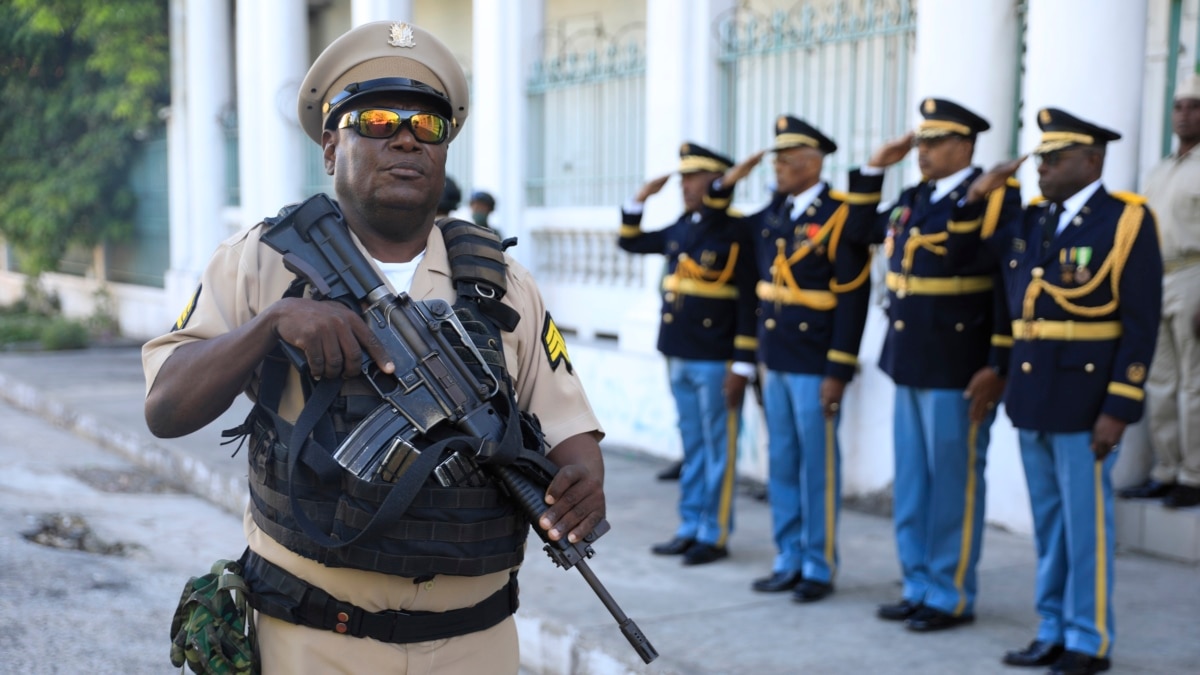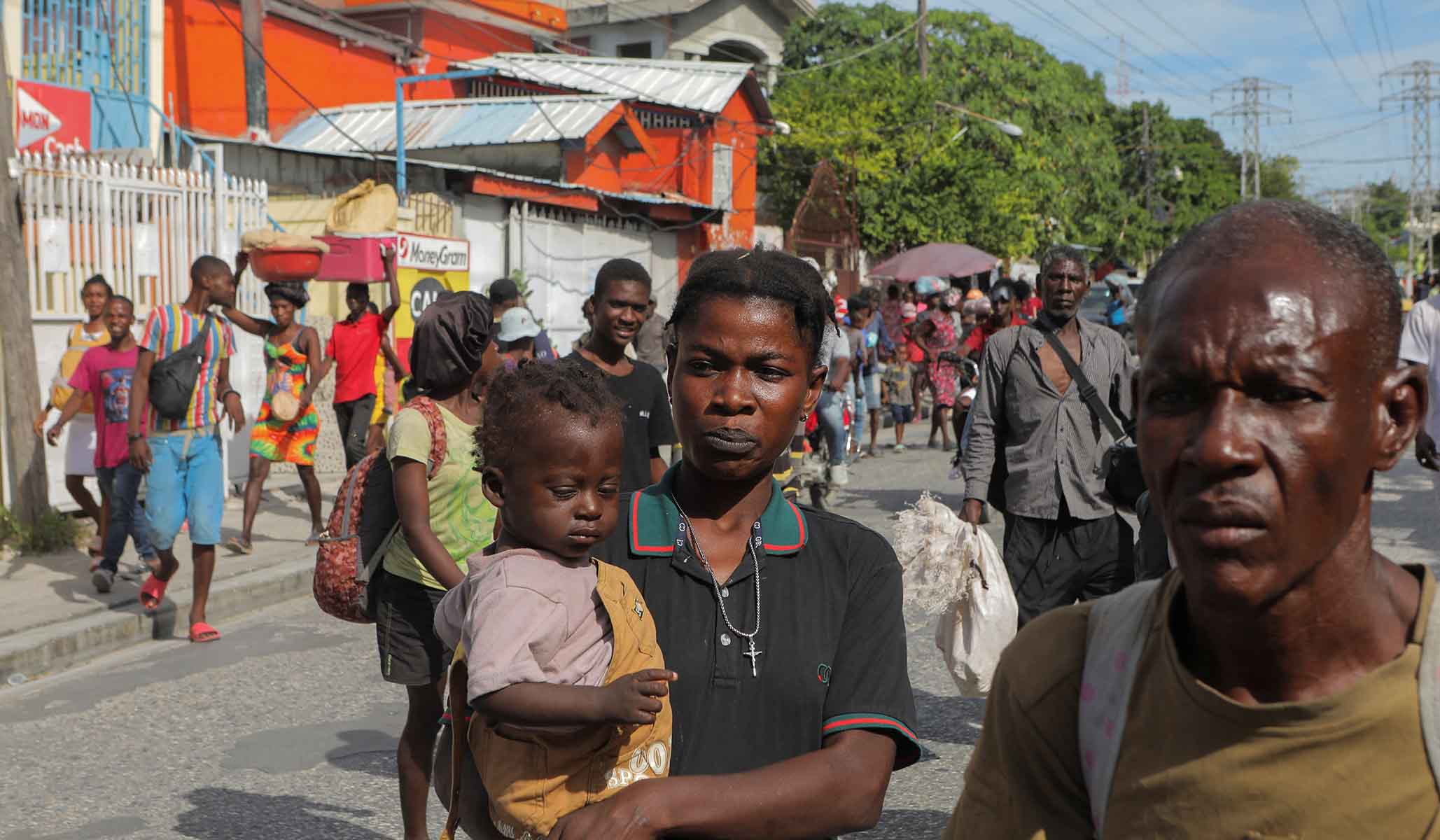Haiti Military Intervention - After the assassination of Haiti's president, Jovenel Moïse, in the early hours of last Wednesday, the impoverished Caribbean nation's interim government called for foreign military intervention to protect infrastructure themes. The call came after evidence that the 28 people accused of storming the Moise residence and shooting the president and his wife several times had the support of a powerful group among Haitian politicians.
The murders took place at 1 a.m. local time on July 7 and included 26 Colombian nationals and two Haitian-Americans. Seventeen suspects have been arrested, three are dead and eight are still being hunted. Underlining the attack enjoyed in support, armed gangs entered the house of Moïse in Petionville, a suburb of the capital of Port-au-Prince. The gunman reportedly obtained floor plans showing the layout of Moise's residence, and no one of the president's security personnel was injured in the attack.
Haiti Military Intervention

Haiti's ambassador to Washington, Bocchit Edmond, sent a letter to Secretary of State Antony Blinken requesting that U.S. troops enter the war. "We look forward to working with the U.S. Embassy in Port-au-Prince to seek truth and justice for President Moise's family and the people of Haiti," he wrote.
Brazil's Incoming Government Unlikely To Provide Military Assistance To Haiti, Officials Say
Security guards stand near the residence of interim president Claude Joseph in Port-au-Prince, Haiti, four days after the assassination of Haiti's president, Sunday, July 11, 2021. (AP Photo/Matias Delacroix)
The idea that military intervention by the US or any other imperialist country (including Canada or France) can stabilize the situation is absurd. The fact is that nearly a decade of imperial rule has left the poorest country in the west, socially and economically, in a state of political conflict that is now intensifying.
The last assassination of a Haitian head of state in 1915 led to a 20-year U.S. occupation of the country. More recently, the U.S. government, backed by Canada and the United Nations, overthrew democratically elected President Jean-Bertrand Aristide in 2004, a regime change ironically dubbed "Liberty." The U.S. and Canada have partnered with several right-wing parties to create a government more receptive to Washington's interests, overseeing the creation of a government backed by death squads funded by the same people who have been attacked with impunity by Haiti's poor. What followed was a 13-year U.N.-supervised military campaign against the country that included repeated allegations of violating the human rights of many Haitians and fomenting a deadly epidemic of cholera that killed tens of thousands.
Moise, a right-wing politician hated by many, was the candidate of ex-singer Michel Martelly, who led the U.S. State Department's direct intervention in Haiti under Hillary Clinton in 2010 and 2011. Appointed as president after the election. His successor was close to members of the U.S.-backed Duvalier regime, which ruled the impoverished country with an iron fist for three and ten years until 1986. Washington supported Martelly and Moise because of their clear determination to comply with the IMF. Fiscal policy was designed to support the needs of the imperial government.
Growing Calls For Armed Foreign Intervention In Haiti
However, a special military intervention is being deployed with the aim of deepening the precarious situation in which most Haitians are exploited by local politicians and their imperialism. of
A new military operation has begun and said in a press release after Moise's assassination that "swift and forceful intervention" was needed. The newspaper said Haiti was "threatened by violence" that "posed an immediate humanitarian threat to millions of Haitians and an internal and security challenge to the United States and key international institutions."
Although the Biden administration has said it has no immediate plans to send troops, international intervention led by the United States is already underway. Washington has vowed to move the FBI and the Department of Homeland Security to Port-au-Prince, apparently to aid in the investigation into the assassination of the Haitian president.

The purpose of the device was not to expose, but to conceal, the real supporters of the assassination of Moise and their possible supporters in rival groups of Haitian politicians. The politician's party clashed with Moise as he made a last-ditch effort to keep the dictator in power and used his state power to win a large group of people for him and his friends, some of the most effective parts of the government. Haitian economy. That includes challenging the dominance of historically richest American families in public works contracts, oil distribution and telecommunications mobility, which has led to high costs and dangerous profits for the poor.
How Operation Uphold Democracy Still Affects Life In Haiti
Behind the guise of "assisting the investigation", US officials will certainly use all means and coaxing to piece together different groups in Haiti, equally bad and corrupt. Politicians are engaged in a bloody struggle for political and economic power and the opportunities that result from it.
The hope of foreign policy experts in Washington is to create a political base in Haiti that would allow another round of rigged elections later this year, thereby dispelling the myth of the poorest country in the West — the result. More than a century of American imperialism and plunder - on the way to a "democratic renaissance".
It's a tall order given the high level of animosity between rival factions of Haiti's political elite that has led to the first assassination of a sitting president in more than a century. At least three people have already made claims for the interim presidency responsible for holding new elections: Claude Joseph's prime minister, Moïse; Moïse's chosen prime minister, but Ariel Henry has not yet been sworn in; and Joseph, president of Haiti's defunct senate. Lambert.
Moise's coup attempt included ruling by presidential decree for more than a year after failing to hold parliamentary elections; refusing to resign in February after five years under Haiti's constitution; the inauguration of the "retirement" of three Supreme Court justices; and the proposed A referendum is held to amend the country's constitution, abolish the prime minister and strengthen the presidency.
Haitian President's Assassination Exposes Shady World Of Colombian Mercenaries
In the months leading up to his assassination, Moise attempted to launch populist attacks on the ruling elite, including delivering speeches against "oligarchs". This is a big scam because Moise is a nuisance because of his aggressive enforcement of IMF-backed austerity measures, including a sudden 50% increase in gas prices in 2018, which led many to protest against him and his government.
Even with a political process and elections later this year, fraud, intimidation and violence will do as much damage as the last election that brought Moise to power with about 23 percent of the electorate. They will not be able to take a single step from the political, health and economic chaos engulfing the country, exacerbated by the dire crisis of the COVID-19 disease.
Overcoming the dangers facing many Haitians can only be achieved through an independent political struggle led by the Haitian working class, with the oppressed at their head and in close cooperation with them. Brothers and sisters in the United States, Canada and throughout the region, end oppression by national governments. For U.S. intervention from 1915 to 1934, see U.S. Occupation of Haiti.

Examples and information in this article refer to the United States and do not reflect a global perspective on the subject. If appropriate, you can improve this article, discuss the issue on the talk page, or create a new article. (October 2018) (learn how and where to delete this sample message)
Haiti's Last Resort: Gangs And The Prospect Of Foreign Intervention
Soldiers of Company C, 2nd Company, 22nd Infantry Regiment, 27th Engineer Battalion, 10th Mountain Division defend Port-au-Prince airport on the first day of Operation Uphold Democracy.
Action Uphold Democracy was a military intervention aimed at overthrowing the military regime established in Haiti by the 1991 coup that overthrew democratically elected President Jean-Bertrand Aristide. The operation was effectively authorized by UN Security Council Resolution 940 of 31 July 1994.
The operation began when the United States and its allies warned of an attempted invasion of the island of Haiti. U.S. Navy, Coast Guard and Air Force units are heading to Puerto Rico and southern Florida to prepare to support the airstrike led by Joint Special Operations Command forces.
(Headquarters, 75th Ranger Regiment), followed by the 3rd Special Forces Group, the US Army 7th Transportation Group (Army Ship and Dock Detachment), and the 10th Mountain Division. Some
Will The Haitian Crisis Lead To Yet Another Military Intervention?
Military intervention in nigeria, haiti intervention, military in haiti, haiti military, military intervention in politics, clinton haiti intervention, us intervention haiti, humanitarian military intervention, intervention military, us military intervention, us intervention in haiti, haiti military history
0 Comments